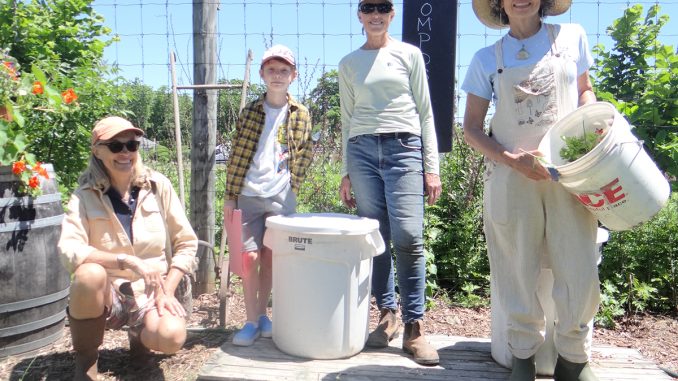
With composting being a simple way to make a positive impact on the environment, ReWild Long Island recently resurrected a pilot compost program that began in Southold Town pre-COVID-19. On a breezy, sunny, spring Saturday at Deep Roots Farm in Southold, residents curious about ways to stop throwing out food scraps signed up to become the first group to reduce their waste and create “perfect black gold” — compost — for farmers.
“When people start to notice they’re tossing food out and throwing away money at the same time, they learn to do something good with it,” said Orient resident Mary Morgan, community compost lead with the North Fork chapter of ReWild Long Island. “Put scraps in a bag in your freezer and bring it to the farm to compost it. Food scraps are not waste; they’re valuable.”
Proponents of the program estimate that a third of the food we buy ends up in the garbage can. Furthermore, they argue that taxpayer dollars spent by the town to truck decaying, smelly fruits and vegetables to the dump is wasteful; even worse, it generates methane, exacerbating climate change.
Soil enriched with compost, ReWild argues, uses a smaller amount of water to grow plants and retains 20% more water leading to less stormwater runoff. It also reduces flooding since it is absorbed into the ground.
With two barn swallows fluttering in the rafters of the Deep Roots barn, Ms. Morgan and Nancy DePas Reinertsen of Southold, who launched ReWild’s North Fork chapter with her husband, Ralph, in February, explained to the crowd the ins and outs of the compost bin.
They said the first step toward clean compost is to remove sticky labels and rubber bands from store-bought produce. Then have a container or plastic bag that fits in the freezer, ready to accept beyond-browned bananas, cucumber peels, coffee grounds, onion skins or eggshells. They explained that worms do their magic once the scraps reach the farm, where the compost is placed in plastic bins, mixed with leaves and then turned over often.
Cooked foods, rice, pasta, dairy and meats are prohibited. “They have oils and fats that don’t break down and they attract rodents,” explained Ms. DePas Reinertsen.
“We don’t have to use fertilizer. With compost, the plant has everything it needs to fight diseases better and we’ll have healthier soil and water retention,” she continued. Participants in the program will receive a bucket of compost at the end of the summer.
Deep Roots, established a decade ago, is the only farm participating in the pilot — for now. Owner Michelle Hart took the group of about 20 would-be composters on a tour of her 22-acre farm.
“All of you can drop off your food scraps 24/7; you can come at midnight if you need to,” she said.
Susan Spear of Southold, who moved to the North Fork from Washington, D.C., said she is excited to become a first-time food composter. “I love the farm stands, but it’s a mess to put that stuff in the regular trash. Anything I can do to reduce what’s in the landfill is great.”
Once summer is over, the pilot program will be assessed, answering questions that may lead the town to replicate the project if all goes well. Ms. Morgan said that in the first pilot four years ago everyone was 100% compliant.
For more information, email Ms. Morgan at [email protected] or visit rewildlongisland.org/compost.

